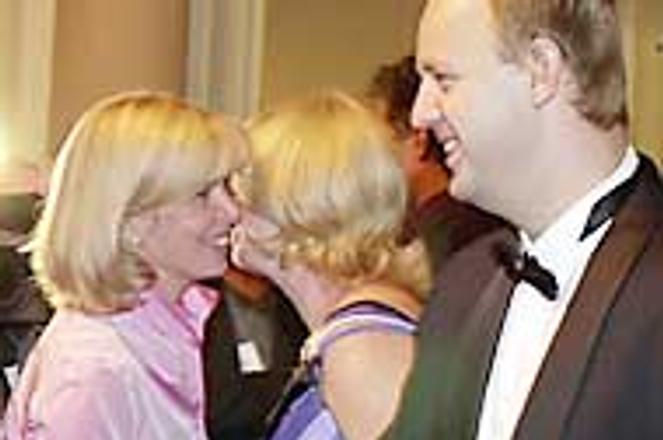MEDIA magnate and political hopeful Pavol Rusko (right) with TV Markíza head Vladimír Repčík.photo: TASR
THE PRIVATE TV station Markíza, co-owned by Ano political party leader Pavol Rusko, finally agreed on August 28 to comply with sanctions by a state media watchdog for using news air time to promote Ano in the lead-up to September general elections.
While the station agreed to broadcast a message stating that Markíza had broken the law by giving Ano preferential coverage, Markíza general director Vladimír Repčík insisted the decision should not be interpreted as an admission the station had violated any rules.
"We are broadcasting the message mainly in order that this campaign against Markíza does not continue, and in order that it does not become part of the pre-election campaign," he said.
The fact the station took over a month to comply with the order by the state Broadcast and Retransmission Council infuriated the regulator, and led to claims that Rusko - who does not hide his ambition for the prime minister's chair - had thereby called into doubt his respect for the country's law.
"It's a problem of legal culture," said council member Ernest Valko, former head of the Czechoslovak Constitutional Court. "It upsets me that a candidate for a possible government function did not set an example by obeying the law [immediately].
"How can the state ask people to observe the law when [potential] state officials disrespect it?" Valko added in an August 20 interview with The Slovak Spectator.
Markíza was first ordered on July 16 by the broadcast authority to inform its viewers of biased political reporting in its main evening news programme.
Not only did the station refuse to comply with the order within the three days set by law, it also incurred further sanctions - including a Sk1 million fine last week - for its obdurate stance.
Council members said before the station's climb-down they were at a loss for what to do.
"It's the first time in the council's history that someone has failed to respect a valid decision," said Jarmila Grujbárová, head of the Broadcast Council office.
"We fear this may send a signal to other stations to act in a similar way, knowing that not much can happen to them," she said.
When Markíza at first did nothing to meet the obligation, the council held a hearing with the broadcaster.
"They did not deny that they had not broadcast it [the message]. They said they would use an extraordinary appeal measure, which is their right. But when I asked them whether they had filed a complaint and requested a delayed execution of the decision, they said they had not. So we had to give them a fine," said Valko.
Markíza was fined Sk1,000,000 ($24,000), and was threatened with another fine in the same amount in September if it continued to refuse to comply.
By far the nation's most popular TV station, Markíza has been repeatedly cited by state and independent media watchdogs for giving Ano more airtime than its political strength merits (the party scores under 10 per cent popularity in most opinion polls) as well as for presenting the party in a positive and uncritical light.
Markíza director Vladimír Repčík said in late July the station had filed an appeal with the Supreme Court and was waiting for a decision. A few days later, however, he told the daily Sme that "we are currently submitting the case to the Supreme Court."
Rusko, a former member of the communist party, attacked the council, saying in a July interview with The Slovak Spectator that the body reminded him of past communist censorship structures.
"Not even the Communist Party organs behaved in such a way. Imagine nine people on some council fining a television station because a news piece discussed only one party. What's up with that?" the Ano leader said.
"Is that freedom of speech? Who dares to interfere with freedom of expression to such an extent that he tells a journalist he must include this or another opinion? What is that? Have we returned to before 1989 or what? Where are these gentlemen getting such divine powers to decide how news pieces should look?
"I'm very sorry to hear Rusko say that," responded Valko.
"It really upsets me, because unlike the Ano leader I was not in the [Communist] party, I was not a functionary. How can he talk about a communist body? We have our powers defined by laws, and we act in accordance with these laws," he said.
Prior to 2000, the council had the power to take away a station's broadcast license if it disobeyed the body's rulings. However, with the aid of current Ano candidate and member of parliament Jirko Malchárek, the law was amended, taking these rights away.
Robert Fico, the country's most popular politician and leader of the non-parliamentary Smer party, said before the August 28 concession that Markíza should have its broadcast license withdrawn.
Fico, who has already set conditions for a future government if he becomes prime minister, said that should Markíza continue to ignore its duty, he would do everything in his power after the elections to take the station's license away.


